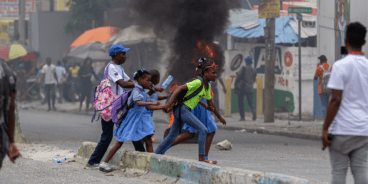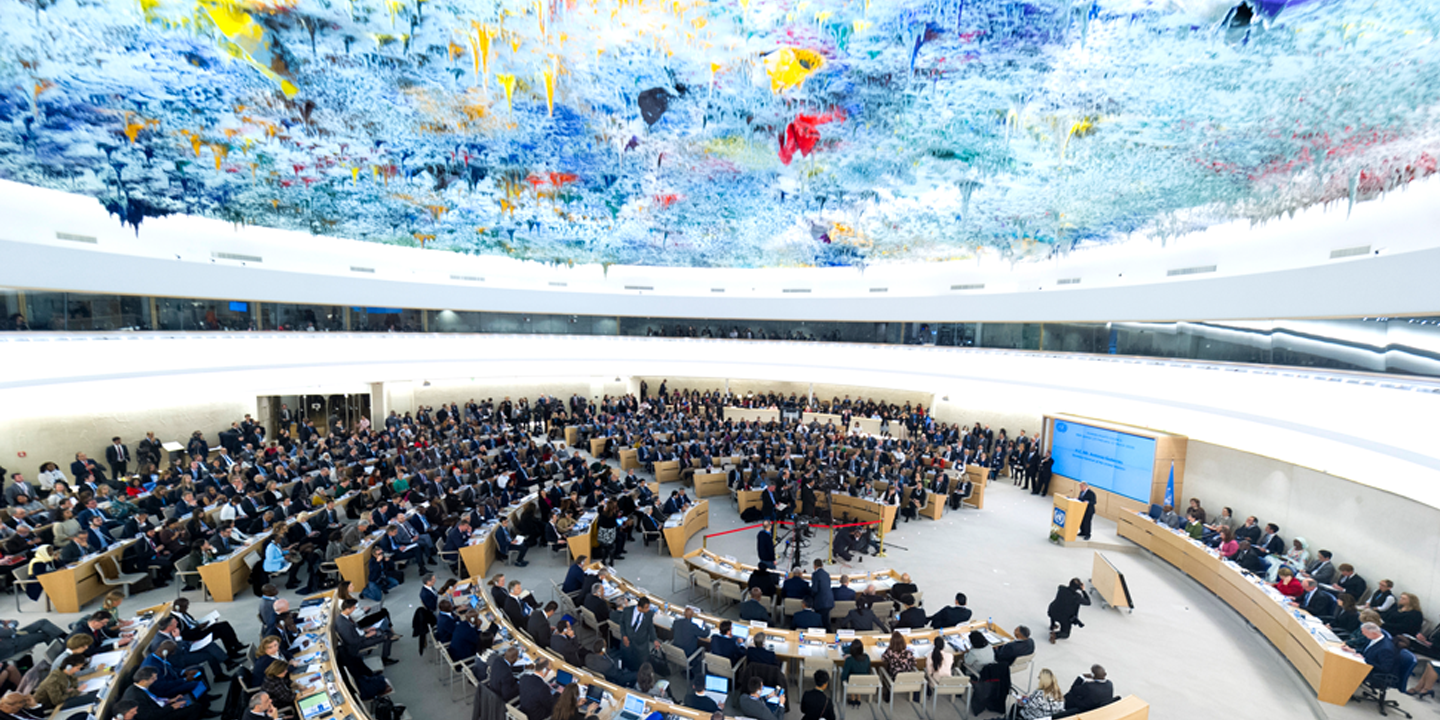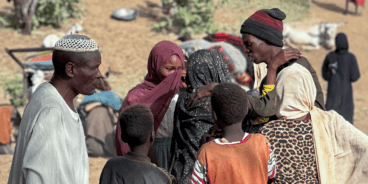

Atrocity Prevention and Outcomes of the Human Rights Council’s 46th Session
The 46th regular session of the UN Human Rights Council (HRC) was held between 22 February and 24 March 2021. As the primary international human rights body, the Human Rights Council has the capacity to prevent and respond to mass atrocity crimes, as systematic violations and abuses of human rights can be a potential indicator of genocide, war crimes, crimes against humanity or ethnic cleansing. The summary below highlights major outcomes and relevant dialogues from the 46th session as they relate to the Responsibility to Protect (R2P) populations from such crimes. As part of the session, the Netherlands delivered a statement on behalf of members of the Group of Friends of R2P.
RESOLUTIONS
A/HRC/46/L.1/Rev.1 Promoting reconciliation, accountability and human rights in Sri Lanka
The HRC expressed serious concern regarding trends emerging over the past year in Sri Lanka, representing a clear warning sign of a deteriorating human rights situation. This includes the increased militarization of civilian government functions, the erosion of the independence of the judiciary, ongoing impunity, political obstruction of accountability for crimes and human rights violations, increased marginalization of persons belonging to the Tamil and Muslim communities, restrictions on public memorialization of victims of war, and alleged torture and other cruel, inhuman degrading treatment or punishment. These trends risk the recurrence of the grave violations perpetrated at the end of Sri Lanka’s civil war. The HRC recognized the importance of preserving and analyzing evidence relating to violations and abuses of human rights and related crimes in Sri Lanka and decided to strengthen the capacity of the Office of the High Commissioner on Human Rights (OHCHR) to collect, consolidate, analyze and preserve information and evidence and to develop possible strategies for future accountability processes. The HRC further requested OHCHR enhance its monitoring and reporting, including on progress in reconciliation and accountability, and to present an oral update to the HRC at its 48th session, a written update at its 49th session, and a comprehensive report that includes further options for advancing accountability at its 51stsession. The resolution was adopted by a vote of 22 in favor, 11 against and 14 abstentions.
A/HRC/46/L.7 Situation of human rights in the Democratic People’s Republic of Korea
The HRC expressed deep concern about the ongoing systematic, widespread and gross human rights violations in the Democratic People’s Republic of Korea (DPRK) that, in many instances, constitute crimes against humanity. The HRC urged the government of DPRK to acknowledge its crimes, abuses and human rights violations, in and outside of the country, and to take immediate steps to end all such crimes, abuses and violations. The HRC further restated its grave concern at the findings of the Commission of Inquiry (CoI) on DPRK, which found reasonable grounds to believe that crimes against humanity have been committed pursuant to policies established at the highest level of the state for decades and by institutions under the effective control of its leadership, and that the authorities of DPRK have failed to prosecute those responsible for crimes against humanity. Welcoming the report of the Special Rapporteur on DPRK, the HRC decided to extent his mandate for a period of one year. The HRC also decided to continue to strengthen the capacity of OHCHR, including its field-based structure in Seoul, for a period of two years. The HRC requested the High Commissioner provide an oral update on the progress made in this regard to the HRC at its 49th session and to submit a full report on the implementation of the recommendations to the HRC at its 52nd session. The resolution recalled “the responsibility of the DPRK to protect its population from crimes against humanity.” The resolution was adopted without a vote.
A/HRC/46/L.17 Technical assistance and capacity building in the field of human rights for Mali
The HRC expressed deep concern about the ongoing deterioration of the security situation in Mali, as well as the intensification of violent extremism and inter-communal violence. The HRC strongly condemned continued violations and abuses of human rights and International Humanitarian Law (IHL), including conflict-related sexual violence, killing and maiming, extrajudicial and summary executions, enforced disappearances, the recruitment and use of children and attacks on schools and hospitals. The HRC recalled that at the request of Malian transitional authorities, the Prosecutor of the International Criminal Court initiated an investigation in January 2013 into crimes committed in Mali since January 2012 and urged the transitional authorities to combat impunity by bringing all perpetrators of such acts to account. The HRC welcomed the report of the CoI on Mali and urged the transitional authorities to establish adequate mechanisms for follow-up on the recommendations of the Commission. The HRC welcomed the close cooperation of the Malian transitional authorities with the Independent Expert on the situation of human rights in Mali and decided to extend the mandate of the Independent Expert for a period of one year. The HRC requested the Independent Expert submit a report to the HRC at its 49th session, followed by a dialogue with the Independent Expert and representatives of the Transitional Government of Mali. The HRC also requested OHCHR to continue to provide the technical assistance. The resolution was adopted without a vote.
A/HRC/46/L.20 Technical assistance and capacity building for South Sudan
The HRC expressed appreciation for the cooperation of the Government of South Sudan with OHCHR, the special procedures of the HRC and the Commission on Human Rights in South Sudan (CHRSS) in the fulfilment of their mandates. The HRC reaffirmed the need to establish the facts and circumstances of alleged violations and abuses of human rights with a view to ensuring that those responsible are held to account, and welcomed the recommendations made by the CHRSS on ending impunity and ensuring accountability. The HRC requested the High Commissioner to provide technical assistance to the Government by monitoring and reporting on the situation of human rights and providing guidance on transitional justice, including accountability, reconciliation and healing. The HRC further requested the High Commissioner present an oral update to the HRC at its 48th session during an enhanced interactive dialogue, and to present a comprehensive written report to the HRC at its 49th session. The resolution recalled “that the Government of South Sudan has the responsibility to protect its populations from crimes against humanity.” The resolution was adopted without a vote.
A/HRC/46/L.21/Rev.1 Situation of human rights in Myanmar
The HRC condemned in the strongest terms the coup against the elected civilian government, carried out by the Myanmar armed forces on 1 February 2021, and expressed deep concern regarding violent acts, including the killing of peaceful demonstrators. The HRC decided to extend the mandate of the Special Rapporteur on the situation of human rights in Myanmar for a period of one year and requested the Special Rapporteur present an oral progress report to the HRC at its 47th and 48th sessions and to submit a written report to the Third Committee of the General Assembly at its 76th session and to the HRC at its 49th session. The HRC further requested the Special Rapporteur, supported by additional human rights experts, assess the situation of human rights since 1 February 2021 and to provide an oral update to the HRC at its 47th and 48th sessions. The HRC also requested the High Commissioner for Human Rights monitor and assess the overall human rights situation in Myanmar and to provide to the HRC an oral update at its 47th session, a written update at its 48th session and a comprehensive report at its 49th session. The HRC also called upon the High Commissioner and the Special Rapporteur to monitor patterns of human rights violations that point to a heightened risk of a human rights emergency and to continue to bring that information to the attention of the HRC in a manner that reflects the urgency of the situation and to advise on what further steps may be needed if the situation continues to deteriorate. The resolution was adopted without a vote.
A/HRC/46/L.24 Situation of human rights in the Syrian Arab Republic
The HRC acknowledged that March 2021 marks 10 years since the peaceful uprising and its brutal repression that led to the conflict in the Syrian Arab Republic. The HRC recalled the statements made by the Secretary-General and the High Commissioner that crimes against humanity and war crimes are likely to have been committed in Syria, as well as the recent conclusions of the CoI on Syria that violations and abuses have included acts that are likely to constitute crimes against humanity, war crimes and other international crimes, including genocide. The HRC also expressed deep concern that the CoI found there are reasonable grounds to believe that the Syrian authorities carried out a widespread and systematic attack against the civilian population, in pursuance of a firmly established state policy, amounting to crimes against humanity. Following a special report by the CoI, which found that arbitrary detention and enforced disappearance, as well as torture and death in detention, have been persistent in Syria’s conflict, the HRC expressed deep regret that the fates of tens of thousands of those detained or disappeared remain unknown. The HRC requested OHCHR to resume its work to establish the extent of civilian casualties and to report on progress through an oral update to the HRC at its 48th session. The HRC decided to extend the mandate of the CoI for a period of one year and requested the CoI to provide an oral update to the HRC during the interactive dialogue at its 47th session and present an updated written report during an interactive dialogue at its 48th and 49th sessions. The HRC demanded that “the Syrian authorities meet their responsibility to protect the Syrian population.” The resolution was adopted by a vote of 27 in favor, 6 against and 14 abstentions.
A/HRC/46/L.29/Rev.1 Situation of human rights in South Sudan
The HRC expressed concern at the findings of the Commission on Human Rights in South Sudan (CHRSS) regarding widespread and pervasive violence at the subnational level and localized conflicts, often with the participation of organized armed militias affiliated with the South Sudan People’s Defence Forces or the Sudan People’s Liberation Army in Opposition. This includes violations against civilians, including abduction of children, murder, rape and other forms of sexual violence. The HRC stressed that those responsible for violations and abuses of human rights and violations of IHL, including any that amount to war crimes or crimes against humanity, should be held accountable. Reaffirming the mandate of the CHRSS – which emphasizes the need to report the facts and circumstances of, to collect and preserve evidence of, and to clarify responsibility for, alleged violations and abuses of human rights and related crimes, with a view to ending impunity and providing accountability, and to make such information available to all transitional justice mechanisms – the HRC extended the mandate of the CHRSS for a period of one year. The HRC requested the CHRSS present an oral update to the HRC at its 48th session and to present a comprehensive written report to the Council at its 49thsession. The HRC recalled that “the Government of South Sudan has the responsibility to protect its population from genocide, war crimes, ethnic cleansing and crimes against humanity.” The resolution was adopted by a vote of 20 in favor, 16 against and 11 abstentions.
A/HRC/46/L.31 Human rights situation in the Occupied Palestinian Territory, including East Jerusalem, and the obligation to ensure accountability and justice
The HRC expressed grave concern at reports of serious human rights violations and grave breaches of international humanitarian law, including of possible war crimes and crimes against humanity, in the Occupied Palestinian Territory, including East Jerusalem, as well as concern that long-standing impunity has allowed for the recurrence of violations. The HRC demanded that Israel, the occupying power, comply fully with international law and that it ceases all measures and actions that violate the human rights of the Palestinian people, including collective punishment in violation of IHL. The HRC also expressed deep concern at the conditions of the Palestinian prisoners and detainees, including minors, in Israeli jails and detention centers and at the continued use of administrative detention. The HRC called upon Israel to explicitly prohibit torture and other cruel, inhuman or degrading treatment or punishment. The HRC requested the High Commissioner report on the implementation of the present resolution to the HRC at its 49th session. The resolution was adopted by a vote of 32 in favor, 6 against and 8 abstentions.
INTERACTIVE DIALOGUES, DEBATES AND UPR
Country-specific
-
- Interactive Dialogue on the High Commissioner’s report on Sri Lanka
- Interactive Dialogue on the oral update of the Group of Eminent Experts on Yemen
- Oral update by the High Commissioner on Venezuela
- Interactive Dialogue with the Fact-Finding Mission on Venezuela
- Interactive Dialogue on the High Commissioner’s oral update on Venezuela
- Interactive Dialogue with the CoI on Burundi
- Interactive Dialogue with the CHRSS
- Interactive Dialogue with the CoI on the Syrian Arab Republic
- Interactive Dialogue with the Special Rapporteur on Myanmar
- Presentation of the High Commissioner’s report on the DPRK
- Enhanced Interactive Dialogue on oral update on the Democratic Republic of the Congo by the High Commissioner and the International Team of Experts on the Kasaï region
- Interactive Dialogue with the Independent Expert on Mali
- High-level Interactive Dialogue on the human rights situation in the Central African Republic
- Presentation of the High Commissioner’s report on Afghanistan
- Outcomes of the Universal Periodic Review of Belarus, Libya and the United States
Thematic
-
- General Debate on Item 2 – Annual report of the United Nations High Commissioner for Human Rights and reports of the Office of the High Commissioner and the Secretary-General
ESTABLISHMENT AND EXTENSION OF COMMISSIONS OF INQUIRY AND SPECIAL PROCEDURES
The HRC extended the mandates of the Special Rapporteur on the DPRK, the Special Rapporteur on Myanmar and the Independent Expert on Mali.
The HRC further extended the mandates of CoI on the Syrian Arab Republic and the CHRSS.
Related Content


Atrocity Alert No. 435: Sudan, Israel and the Occupied Palestinian Territory and Democratic Republic of the Congo
